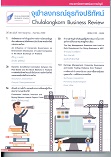ทัศนคติ ความตั้งใจ และพฤติกรรมการซื้อของผู้บริโภคต่ออาหารเกษตรอินทรีย์
Main Article Content
Abstract
บทคัดย่อ
งานวิจัยนี้มีวัตถุประสงค์เพื่อศึกษาและทำความเข้าใจผู้บริโภคคนไทยต่ออาหารเกษตรอินทรีย์ทั้งทางด้านทัศนคติ ความตั้งใจและพฤติกรรมการซื้ออาหารเกษตรอินทรีย์ โดยใช้แบบสอบถามออนไลน์ในการเก็บข้อมูลจากกลุ่มตัวอย่างในประเทศไทยจำนวน 437 คน สำหรับการวิเคราะห์ข้อมูลในงานวิจัยนี้ใช้สถิติเชิงพรรณนา การวิเคราะห์องค์ประกอบ และทดสอบสมมติฐานด้วยการวิเคราะห์ความถดถอยเชิงเส้น ซึ่งผลลัพธ์จากการวิจัยพบว่า 1) ทัศนคติของผู้บริโภคต่ออาหารเกษตรอินทรีย์แบ่งออกได้เป็น 3 องค์ประกอบคือ องค์ประกอบด้านความปลอดภัยและสุขภาพ องค์ประกอบด้านสิ่งแวดล้อมและสวัสดิภาพของสัตว์ และองค์ประกอบด้านแหล่งกำเนิดท้องถิ่น 2) องค์ประกอบด้านสิ่งแวดล้อมและสวัสดิภาพของสัตว์ส่งผลต่อความตั้งใจในการซื้ออาหารเกษตรอินทรีย์ของผู้บริโภคมากที่สุด ตามด้วยองค์ประกอบด้านความปลอดภัยและสุขภาพ และองค์ประกอบด้านแหล่งกำเนิดท้องถิ่น 3) ความตั้งใจในการซื้ออาหารเกษตรอินทรีย์ของผู้บริโภคส่งผลเชิงบวกต่อพฤติกรรมการซื้ออาหารเกษตรอินทรีย์ สำหรับการทดสอบปัจจัยส่วนบุคคลของกลุ่มตัวอย่างด้วยสถิติ t-test และการวิเคราะห์ความแปรปรวนทางเดียวแสดงว่าการรู้จักอาหารเกษตรอินทรีย์จะมีอิทธิพลต่อพฤติกรรมและความตั้งใจในการซื้ออาหารเกษตรอินทรีย์ ขณะที่ความยินดีในการจ่ายสำหรับอาหารเกษตรอินทรีย์มีค่ามากกว่าอาหารปกติที่ค่าเฉลี่ยมากขึ้นร้อยละ 27 ทั้งนี้ผลลัพธ์ที่ได้จากงานวิจัยสามารถนำไปใช้ในการวางแผนและส่งเสริมการบริโภคอาหารเกษตรอินทรีย์ของผู้บริโภคภายในประเทศ โดยการสนับสนุนให้ประชาชนมีความรู้ต่ออาหารเกษตรอินทรีย์ในทัศนคติทั้ง 3 ด้านผ่านการประชาสัมพันธ์ของหน่วยงานที่เกี่ยวข้อง ซึ่งจะส่งผลต่อความตั้งใจและพฤติกรรมในการซื้ออาหารเกษตรอินทรีย์ของผู้บริโภคมากขึ้น นอกจากนี้การกำหนดราคา การขยายช่องทางการจัดจำหน่าย รวมถึงการจัดหาผลผลิตทางเกษตรอินทรีย์ที่ตรงกับความต้องการของตลาด ก็จะเป็นการส่งเสริมปริมาณความต้องการอาหารเกษตรอินทรีย์ และเป็นแรงกดดันต่อเกษตรกร ผู้ผลิตและผู้จัดจำหน่ายในการขยายพื้นที่การเพาะปลูกและเพิ่มช่องทางการจัดจำหน่ายอาหารเกษตรอินทรีย์ให้มีมากขึ้นภายใต้หลักการและแนวทางในการพัฒนาประเทศอย่างยั่งยืนต่อไป
คำสำคัญ: อาหารเกษตรอินทรีย์ ทัศนคติ ความตั้งใจ พฤติกรรม ความยั่งยืน
Abstract
This research aims to study and to understand Thai consumers’ perspective including attitude, intention and buying behavior toward organic foods. The study applied online questionnaires to collect data from 437 respondents in Thailand. For data analysis, the research used descriptive statistics and factor analysis. In addition, hypothesis testing used a linear regression analysis. The results found that 1) Consumers’ attitude toward organic foods could represent with 3 factors including safety and health factor, environment and animal welfare factor, and local origin factor 2) Environment and animal welfare factor impacts on the intention to buy organic foods at the most following by safety and health factor and local origin factor 3) Intention to buy organic foods has positively impacted on buying behavior of organic foods. For testing individual factors by t-test and one-way ANOVA, it expressed that knowing of organic foods impacts on intention to buy and buying behavior toward organic foods. While willingness to pay for organic foods from respondents is 27% more comparing to conventional foods. The results of this research could apply to plan and to promote consumption of organic foods domestically which by encourage people to have knowledge about attitude towards organic foods with 3 factors throughout public relations from related institutions. This is to increase the intention and behavior of buying organic foods. Furthermore, pricing, expanding of distribution channels, and providing organic foods that meet the market will support higher demand of organic foods and also pressures to farmers, producers and distributors in order to expand organic farming area and increase distribution channels under principle and guidance of country development sustainably.
Keywords: organic foods, attitude, intention, behavior, sustainability.
Article Details
Opinions and discussions in papers published by the Creative Business and Sustainability Journal (CBSJ) are deemed as personal opinions and the responsibility of the writers. They are not the opinions or responsibility of the Chulalongkorn Business School of Chulalongkorn University.
Papers, content, information etc. appearing in the Journal are deemed to be the copyright property of the Chulalongkorn Business School of Chulalongkorn University. Anybody or any organization that wishes to publish any part of them or use them in any way must obtain written permission from the Chulalongkorn Business School, Chulalongkorn University.


